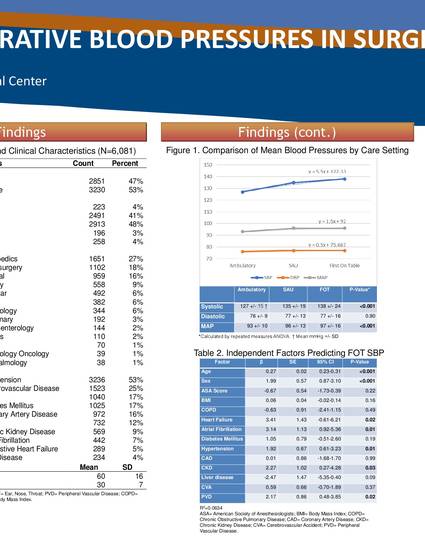
- School of Anesthesia
Background Surgical patients expect anesthesia providers to provide high quality care. Blood pressure variability must be mitigated by establishing the patient’s blood pressure baseline and sustaining it through surgery. A consensus has not been established on which blood pressure measurement should be used as the patient’s baseline. Blood pressures before surgery in multiple care settings have been shown to vary. This may result in differences in drug and fluid administration, depending on the blood pressure considered baseline by the anesthesia provider. The purpose of this observational evidence-based practice project was to compare mean blood pressures leading up to surgery among patients at Providence Sacred Heart Medical Center (PSHMC).
Methods Literature review identified five high quality studies to inform this project. • Institutional approval sought and obtained. IRB determined exempt research. • Data on adult, elective surgical patients receiving a general anesthetic from 09/30/2017-10/1/2018 were extracted in an anonymized fashion. • Patients characterized by demographic and clinical characteristics (table 1). • Mean blood pressures calculated from three settings: ambulatory clinics in the 12 months prior to surgery, the surgical admit unit (SAU) and the “first on table” (FOT) or first pressure recorded in the operating room. Patients without blood pressures recorded in each care setting excluded. • Repeated measures ANOVA and multiple linear regression (α=0.05).
Discussion SBP increased significantly from the pre-surgical ambulatory period to the first on table (FOT) blood pressure taken in the operating room. Changes in MAP were statistically, but not clinically, significant. A multivariable regression model revealed age, sex, heart failure, atrial fibrillation, hypertension, chronic kidney disease and peripheral vascular disease to be factors predictive of increasing FOT SBP. Our findings are consistent with current research evidence. Providence Sacred Heart Medical Center patients may experience over-treatment for hypotension if the first-ontable SBP is utilized as a baseline. This overtreatment may result in increased monetary and physical costs.
Available at: http://works.bepress.com/kenn-daratha/13/
